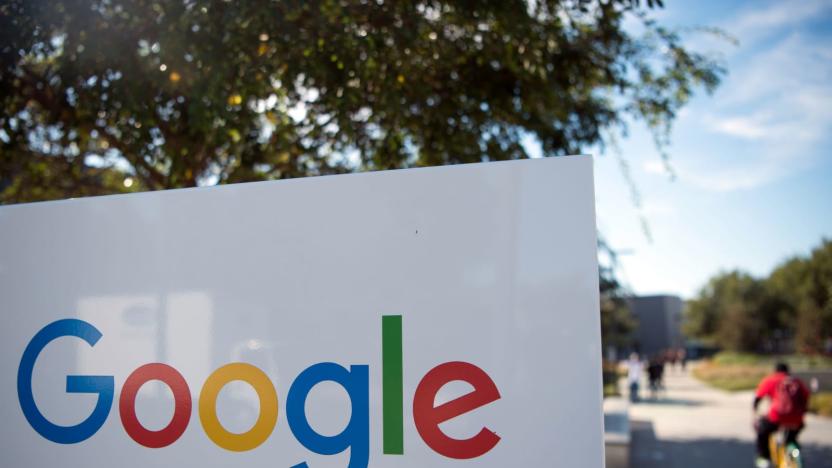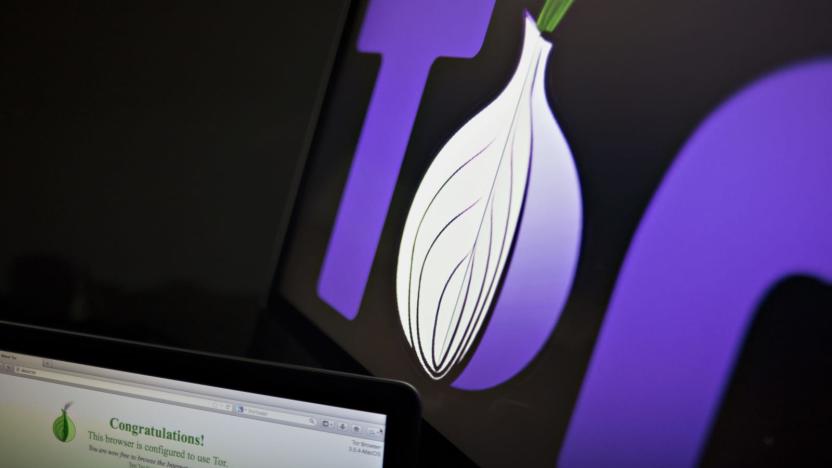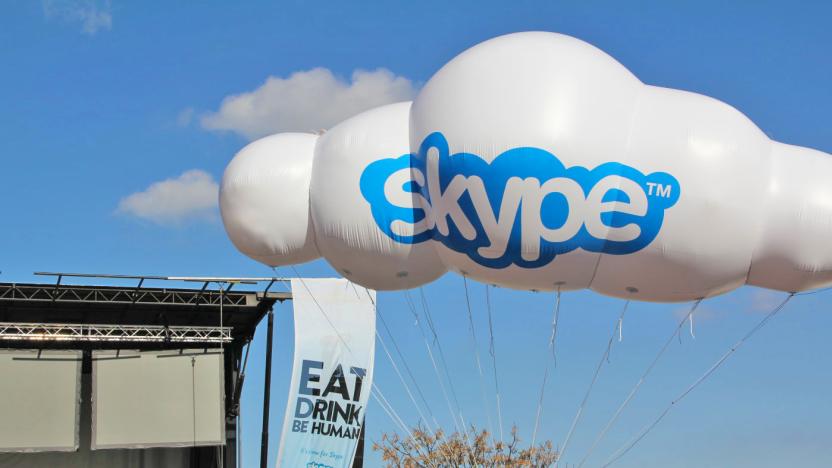ipaddress
Latest

Timehop's breach included user birthdate and gender data
It turns out that more than just names, usernames, email addresses and phone numbers were pilfered in the recent Timehop breach. You can add "birthdate" and "gender" to the list of data stolen in last week's hack, too. The company apologized for the piecemeal way it has delivered the information to customers, and has published a timeline of the events, which started last December and concluded July 5th.

Google accidentally broke the internet throughout Japan
Last week, nearly half of Japan briefly lost access to the internet because of an error made by Google. The mistake was noticed and corrected within just a few minutes, but its effects led to hours of slowed internet connections. The impact was so large that Japan's Internal Affairs and Communications Ministry initiated an investigation into the issue.

Tor Browser 7.0 works harder to protect your anonymity on its own
The latest update for privacy-minded folks' favorite way to surf the web should make others' attempts at tracking what they do even more difficult. The Tor browser's 7. 0 version introduces a sandbox feature that, according to an interview on the Tor blog, should "make life a lot harder" for people using a Firefox exploit to discern the identities of a user. "It's like Plato's Allegory of the Cave," Tor developer Yawning Angel said. "The only reality Tor Browser knows is inside of the sandbox (cave). We prevent it from interacting with the rest of your computer (the outside world), except via the Tor Network (shadows on the wall)."

Kansas duo sues IP mappers for putting them through 'digital hell'
Imagine the exact center of the United States, somewhere in the middle of rural Kansas. There lies 360 acres of farmland rented by the Arnolds, a couple and their two sons who moved there in 2011. Within the week, law enforcement showed up looking for a stolen vehicle, the first in a deluge of visits from local, state and federal forces investigating crimes. Why show up at their farm? Because the IP address mapping company MaxMind made those coordinates the default location for users when they don't know where they are in the US. Now the Arnolds have filed suit against them for all the trouble that comes with being the first place cops look when criminals try to mask their area.

Skype hides IP addresses to protect users from online trolls
Let's be honest: it's pretty hard to find someone who will be genuinely happy for you when you win something. When it comes to online gaming, however, that probability falls to zero. Losing a multiplayer game leaves some people so angry that they'll go out of their way to force fellow players offline. In order to do this, gamers can use tools to locate a target's IP address from just their target's Skype username and then launch a DDoS attack to overload their internet connection. It's not the most common attack vector but Microsoft has changed the way its messaging app works so that gamers, and the wider Skype community, can rest a little easier knowing it's harder for them to be tracked.

The US runs out of old-school internet addresses this summer
The conventional internet address is about to go the way of the dodo... at least, in the US and Canada. According to estimates, North America will run out of IPv4 addresses (the familiar 1.2.3.4 format) this summer. While some companies might stall this by letting go of IPv4 numbers they don't use, many others will have little choice but to move to IPv6 (hexadecimals) if they want to add new addresses on their networks. The newer standard is already in widespread use, so don't worry about an imminent meltdown. Facebook wouldn't even be functioning unless it had already migrated a lot of servers to IPv6, for instance.

The internet's governing body was hacked, too
The Sony Pictures hack is getting all of the attention right about now, but it turns out that another prominent organization recently was victim to a security breach as well. Last month, ICANN, the outfit that regulates the internet's domain names and IP addresses, fell prey to a phishing attack that tricked employees into giving out email login info. What'd the ne'er-do-wells get a hold of? Administrative access to all the files in the Centralized Zone Data System. Which, as The Register points out, granted the hackers access to unalterable generic zone files (what're needed to resolve domain names to IP addresses), and gifted them with contact information for, among others, some of the world's registry administrators. Passwords were stored as "salted cryptographic hashes," but ICANN deactivated them as a precaution anyway. The firm's wiki was breached too, but aside from public information, a members-only index page and one user's profile, no other private data was viewed.

UK wants internet providers to identify who's using their connections
The British government isn't letting up on its desire to track internet activity in the name of fighting terrorism. UK Home Secretary Theresa May is proposing a bill that would require internet providers to keep tabs on who's using a given internet protocol (IP) address and hand it over to the police, who could theoretically use it to hunt down suspects. Full details aren't available yet, but there would be some accountability involved. Police would have to get permission before collecting IP address info, and there would be documentation showing both when and why they needed that data.

RIPE NCC handing out its last block of IPv4 addresses, tries to fend off internet survivalism
In a world where IPv6 lives and IPv4 addresses are scarce, network providers must fight for survival... or at least, claim their IP blocks quickly. The RIPE NCC, the regional internet registry for Asia, Europe and the Middle East, warns that it's down to assigning its last set of 16.8 million IPv4 addresses as of this weekend. That sounds like a lot, but we'd do well to remember that the registry churned through about 5.2 million addresses in just the past two weeks. What's left won't be around for long, folks. To cut back on the number of Mad Max-style battles for dwindling resources, RIPE NCC is rationing out IPv4 for local registries in 1,024-address chunks -- and only to those who both have IPv6 assignments as well as proof of a need for IPv4. With just a bit more than half of the RIPE NCC's customers currently on IPv6, that could still trigger a shortfall among networks that haven't prepared for the internet protocol apocalypse. We'd advise that companies stock up on IPv6 supplies before launching the raiding parties.

IPv6 lands today, do you copy?
June 6th has arrived, which means that participating ISPs, hardware manufacturers and search engines must stick to their word and permanently enable the IPv6 address system -- not least as an encouragement for others to do the same. The ultimate purpose? To allow trillions of users to have their own IP address, instead of just a paltry few billion permitted by the IPv4 standard that continues to run in parallel. The risk? That the Internet collapses and we all get the day off work. Evidently that hasn't happened, no doubt thanks to Google and others having tested the system during pilot programs, and indeed Vint Cerf's explanatory video seems to be working fine after the break.

Voltage Pictures dismisses 90 percent of defendants in Hurt Locker file-sharing lawsuit
That record-breaking Hurt Locker lawsuit may not be so impressive after all, now that Voltage Pictures has slashed a major chunk of defendants from its file-sharing complaint. Last week, the company voluntarily dismissed about 90 percent of the 24,583 defendants originally named in the suit, according to documents filed with the US District Court for the District of Columbia. The dismissals were made without prejudice, meaning they could theoretically be re-targeted in the future, though the number of those that reached settlements with Voltage remains unclear. The company also identified some of the alleged file-sharers by name, but acknowledged that 2,278 IP addresses remain anonymous. For more details, check out the coverage from TorrentFreak, where you'll find the full list of dismissed IP addresses, along with the recently-named defendants.

Telex anti-censorship system promises to leap over firewalls without getting burned
Human rights activists and free speech advocates have every reason to worry about the future of an open and uncensored internet, but researchers from the University of Michigan and the University of Waterloo have come up with a new tool that may help put their fears to rest. Their system, called Telex, proposes to circumvent government censors by using some clever cryptographic techniques. Unlike similar schemes, which typically require users to deploy secret IP addresses and encryption keys, Telex would only ask that they download a piece of software. With the program onboard, users in firewalled countries would then be able to visit blacklisted sites by establishing a decoy connection to any unblocked address. The software would automatically recognize this connection as a Telex request and tag it with a secret code visible only to participating ISPs, which could then divert these requests to banned sites. By essentially creating a proxy server without an IP address, the concept could make verboten connections more difficult to trace, but it would still rely upon the cooperation of many ISPs stationed outside the country in question -- which could pose a significant obstacle to its realization. At this point, Telex is still in a proof-of-concept phase, but you can find out more in the full press release, after the break.

GreenChip lighting lets you flip the switch remotely, thumbs nose at IPv4 depletion
Despite the looming IPv4 apocalypse, a new lighting system coming out of NXP Semiconductors promises an "IP address for every light bulb." The GreenChip "smart lighting solution" incorporates NXP chipsets into both LED and compact fluorescents to enable dimming, extended lifespans, quick start times, and IP connectivity -- via IPv4 or IPv6. Proprietary network software allows users to control their bulbs from smartphones, PCs, and other devices, enabling them to fiddle with mood lighting -- including adjusting color -- via a specific IP address. So at least when IPv4 doomsday finally descends someone will have their lighting just right. Video and PR after the break.

China tightens grip on VPN access amid pro-democracy protests, Gmail users also affected
If you've been struggling to get your dose of Facebook or Twitter in China recently, then you're probably one of the many Internet users who've had their VPN access -- either free or paid for -- blocked over the last two weeks or so. That's right, the notorious Great Firewall of China is still alive and well, and leaving proxy servers aside, VPN is pretty much the only way for keen netizens to access websites that are deemed too sensitive for their eyes; or to "leap over the wall," as they say. Alas, the recent pro-democracy protests didn't exactly do these guys any favor -- for one, their organizers used Twitter along with an overseas human rights website to gather protesters, and with the National People's Congress meetings that were about to take place (and wrapped up last night), it was no surprise that the government went tough on this little bypassing trick. To make matters worse, PC World is reporting that Gmail users are also affected by slow or limited access, despite the service previously being free from China's blacklist. We reached out to a handful of major VPN service providers, and they all confirmed a significant increase in the amount of blockage -- possibly by having their servers' PPTP IP addresses blocked -- over the last two weeks. One company even spotted the Chinese government subscribing to its paid service, only to work its way into the network to locate the company's PPTP server list, and then put them behind the firewall. Fortunately for some, the better-off companies had backup servers to rapidly resolve the problem, whereas the cheaper and free services were unable to dodge the bullet. This just goes to show that sometimes you get what you pay for. That said, with practically unlimited human hacking power at its disposal, it doesn't take much for the firewall to shut down everything heading its way. For the sake of our friends and expats there, let's just hope that the government will take things down a notch as soon as the storm calms.

Vint Cerf on IPv4 depletion: 'Who the hell knew how much address space we needed?'
Father of the internet, Vint Cerf, is taking one on the knuckles this week for the inevitable diminution of the world's IPv4 addresses. Last Friday, The Sydney Morning Herald ran a sensational story titled, "Internet Armageddon all my fault: Google chief," in which Cerf warned of an end to unique IP addresses "within weeks." The story was, of course, a bit tongue-in-cheek, considering the industry has long anticipated and prepared for said Armageddon. Back in 1977, Cerf led a team of DARPA researchers in creating IPv4, which limits IP addresses to four 8-bit numbers or 32-bits total, providing for 4.3 billion addresses: not nearly enough by today's standards. In the article, Cerf said he never expected his protocol to take off, adding, "Who the hell knew how much address space we needed?" The IPv4's successor, IPv6, which enlists four 32-bit numbers or 128 bits total, was developed soon after Cerf's protocol and is now getting attention from internet giants like Google and Facebook, who will launch World IPv6 Day this June. Considering IPv6 makes for 340,282,366,920,938,463,463,374,607,431,768,211,456 unique addresses, we probably won't be hearing of an IP apocalypse anytime soon.

Apple rumor roundup: pipe dreams, Lala's role and Verizon's iPhone 4G
In case you haven't noticed, things are getting out of hand in the world of Apple rumors. Frankly, it's all we can do to read another one and trudge onward, but hey -- we've no problem with folks putting their reputations on the line here. Let's dig in to the latest pair, shall we? The rumor: Apple's acquisition of Lala will actually lead to customers having access to an "online locker" for multimedia. This could be a cloud storage location for one's iTunes library, enabling them to have access to their jams and vids even when away from their at-home storage. The trick is that the cloud would only hold the metadata, and streaming would originate from somewhere else on Apple's end. Our take: Okay, so we want to believe. Just imagine if your next Apple tablet or iPhone knew exactly what songs you owned in iTunes, and at a moment's notice, you could tap into the iTunes store and stream full, unedited versions of those songs from anywhere. Amazing, no? Problem is, the bulk of iTunes libraries aren't made up of content that was purchased in iTunes (or purchased at all). It seems that the best Apple could do would be to negotiate streaming deals for content you've actually purchased within iTunes, which results in a half-baked user experience. Last we checked, Stevie J wasn't much on half-baked user experiences. The rumor: Astoundingly, the mythical Apple tablet won't be the company's "one more thing" next week; instead, it'll be a refreshed iPhone... that works on Verizon Wireless. Oh, and iPhone OS 4.0. So says Canaccord Adams analyst Peter Misek, anyway. Our take: Ha! Apple has never been one to showcase too much at one time, and we're guessing that the outfit would be smart enough to withhold a new iPhone introduction for a separate press event. We don't doubt that a Verizon iPhone is in the works (though an LTE version will be at least a year or two out), but there's no way Jobs steals the tablet's thunder by giving every rabid iPhone user hot sweats when considering the switch to Big Red. Bottom line? Don't bank on it. At this point, we reckon everyone would be best served by taking a huge step back, a deep breath and one of those so-called "chill pills." Next Wednesday ain't so far away, now is it?

ENUM: it's the new telephone number, but it's going nowhere fast
We've heard (ever-so-briefly) about ENUM before, which is generally described as an IETF-sanctioned standard for converting traditional phone numbers into IP addresses. But for the most part, even techies would say that they aren't exactly up to speed on what the protocol offers and / or promises. ArsTechnica has spent a good while underneath the mire, and it has arisen with an in-depth article that spells out how the standard can neatly collate a variety of contact options (email address, mobile number, home line, Facebook account, ICQ name, etc.) into a single address that's recognizable by the internet that we so dearly love. In fact, user ENUM even has the capability to rank contact options by priority, so you could hit someone up via the mobile first and their Twitter account second should they not answer. The issue, however, is that the '"ENUM standard (RFC 3761) demands that ENUM is a public service and that the control of the telephone number lies in the hands of the end-user," and it doesn't take an economist to understand why ISPs and carriers wouldn't be fond of this. Indeed, just nine nations have an ENUM registry in production, and the future isn't looking too bright for the rest of us. Don't fret, though -- chances are Google will have this whole "multiple contact" thing ironed out before the next decade rolls around.

Interview reveals some secrets behind MGS: Portable Ops
1UP has chatted with the people behind the upcoming Metal Gear Solid: Portable Ops and there are a few bullet points that are pretty juicy. [Andrew's note: I'm typing this while Sony continues to not say anything interesting in their press conference.]The classic Kurosawa film Seven Samurai is the inspiration behind your newfound ability to recruit friends in the game.The unique character generated through multiplayer is determined by the IP address of the hotspot you connect to.The characters obviously feature unique attributes. Unsurprisingly, Snake will not be the best character to play as in the game. He's very recognizable, as he's gained quite a bit of infamy by this point in this story.The game is being developed by the same team as Metal Gear Acid, for better or worse.










